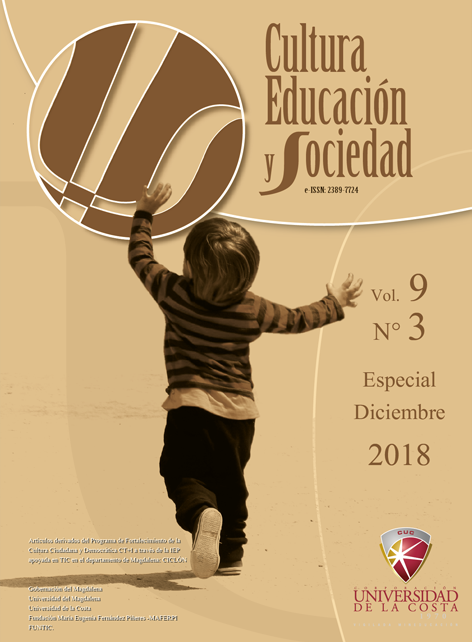Pedagogical actions and their incidence in the management of solid resources
DOI:
https://doi.org/10.17981/cultedusoc.9.3.2018.02Keywords:
Pedagogical actions; solid waste; environmental; TICAbstract
One of the great difficulties that occur in educational institutions, is the inadequate management of solid waste in students for various reasons. For this reason the present study, sought to perform an intervention supported by ICT, to implement in the students a friendly mentality with the environment, instilling to students a sense of respect and care with the environment of the institution and the environment, mainly in the collection and classification of the waste generated in your institution. Methodologically, it was oriented under a qualitative approach, from a descriptive design, where the instruments of participant observation format and field diary were used. The sample consisted of 250 students of the morning session of the Departmental Education Institution San José Sede No. 4. The results show that, once the implementation of the strategy, it was possible to impart a change to the students, especially evidenced in the schedules of recreation where an improvement in the management of solid waste was reflected.
Downloads
References
Cabello-Eras, J. (2016). Acercamiento a la producción más limpia como estrategia de gestión ambiental. International Journal of Management Sciences and Operations Research, 1(1), 4-7. Recuperado a partir de http://ijmsoridi.com/index.php/ijmsor/article/view/71
Cortés-Peña, O. (2016). Sustainable development in synergistic relationship with pro-ambient behavior and fair trade. INTERNATIONAL JOURNAL OF MANAGEMENT SCIENCE AND OPERATION RESEARCH (IJMSOR), 1(1), 54-58. Retrieved from http://ijmsoridi.com/index.php/ijmsor/article/view/78
Crissien-Borrero, T., Cortés-Peña, O., & Herrera-Mendoza, K. (2016). Pro-Environmental Assessment and Sustainable Consumption of Household Public Services in Barranquilla Colombia. The European Proceedings of Social & Behavioural Sciences – EpSBS, 17, 434-440. http://dx.doi.org/10.15405/epsbs.2016.11
Domínguez, S. (2009). Las instituciones educativas en la representación social de la ciencia en estudiantes de pregrado. Interamerican Journal of Psychology, 43(3), 456-465.
Herrera, K. (2011). La crisis medioambiental. Una mirada desde la psicología. Ed. Educosta: Colombia.
Herrera-Mendoza, K., Acuña, M., y Gil, L. (2017). Motivación de jóvenes hacia el uso de teléfonos celulares. Revista encuentros. Vol. 15(1). Pp. 91-105.
Herrera-Mendoza, K., Ramírez, M., y Acuña, M. (2016). Actitud y conducta pro-ecológica en jóvenes universitarios. Revista Opción. Vol. 32(13). Pp. 456-477.
Herrera-Mendoza, K., y Bravo, E. (2013). Perspectiva de la ecología en la comprensión de los comportamientos ambientales. Revista Omnia. Vol. 19(3): pp. 20-30.
Martínez Castillo, R. (2010). La importancia de la educación ambiental ante la problemática actual. Revista Electrónica Educare, XIV (1), 97-111.
Meza, A., Arrieta, M. y Noli S. (2018). Análisis de la conciliación extrajudicial civil en la Costa Atlántica colombiana. JURÍDICAS CUC, vol. 14, no. 1, pp. 187-210. DOI: http://dx.doi.org/10.17981/juridcuc.14.1.2018.9
Ministerio de Educación Nacional (2005) Educación Ambiental: construir educación y país. Altablero. Recuperado de https://www.mineducacion.gov.co/1621/article-90891.html
Nieves Cristancho, J., & Salazar Arrieta, F. (2016). e-Supply chain management para una empresa de tecnología. International Journal of Management Sciences and Operations Research, 1(1), 31-34. Recuperado a partir de http://ijmsoridi.com/index.php/ijmsor/article/view/74
Observatorio ambiental de Bogotá (2015) Manejo Residuos Sólidos. Recuperado de http://oab2.ambientebogota.gov.co/es/educacion-ambiental/ayuda-de-tareas/manejo-residuos-solidos
Organización Hesperian (2011) Guía comunitaria para la salud ambiental. Desechos sólidos: cómo convertir un riesgo para la salud en un recurso. Recuperado de http://hesperian.org/wp-content/uploads/pdf/es_cgeh_2011/es_cgeh_2011_cap18.pdf
Penagos J., Adarraga J., Aguas D. y Molina E. (2011) Reducción de los residuos sólidos orgánicos en Colombia por medio del compostaje líquido. Revista Ingeniare. Núm. 11, pp. 37-44. Doi. https://doi.org/10.18041/1909-2458/ingeniare.11.643
Revista Semana. (11 de mayo de 2018) Basura a punto de explotar. Sección Impacto. Recuperado de https://sostenibilidad.semana.com/impacto/articulo/manejo-de-residuos-en-colombia-es-una-bomba-a-punto-de-estallar/40963
Sáenz J. (2017) Investigación educativa. Fundamentos teóricos, procesos y elementos práctico con ejemplos, esencial para TFC, TFM y tesis. UNED publicaciones. Madrid.
Sistema Nacional Ambiental, SINA (2016) Los proyectos ambientales escolares –PRAE, en Colombia: viveros de la nueva ciudadanía ambiental de un país que se construye en el escenario del posconflicto y la paz. Recuperado de http://www.minambiente.gov.co/images/OrdenamientoAmbientalTerritorialyCoordinaciondelSIN/pdf/VII_Encuentro_Nacional_de_Educaci%C3%B3n_Ambiental/PRAE.pdf
Tejada G. (2006) Manejo de residuos sólidos en la ciudad de Tacna. Revista ciencia y desarrollo. Núm. 10. Recuperado de http://revistas.unjbg.edu.pe/index.php/CYD/article/view/205/182
UNESCO (2010) Los residuos electrónicos: Un desafío para la Sociedad del Conocimiento en América Latina y el Caribe. Recuperado de http://www.unesco.org.uy/ci/fileadmin/comunicacion-informacion/LibroE-Basura-web.pdf
Downloads
Published
How to Cite
Issue
Section
License
Copyright (c) 2018 CULTURA EDUCACIÓN Y SOCIEDAD

This work is licensed under a Creative Commons Attribution-NonCommercial-NoDerivatives 4.0 International License.
![]()
Creative Commons 2020 CULTURA EDUCACIÓN Y SOCIEDAD
This article is under international license Creative Commons Reconocimiento-NoComercial-SinObrasDerivadas 4.0.
The published articles are the sole responsibility of their authors and do not necessarily reflect the opinions of the editorial committee.
CULTURA EDUCACIÓN Y SOCIEDAD respects the moral rights of its authors, who assign to the editorial committee the patrimonial rights of the published material. In turn, the authors inform that this work is unpublished and has not been previously published.
All articles are under a:
Licencia Creative Commons Atribución-NoComercial-SinDerivadas 4.0 Internacional.
![]()


 English
English
 Español (España)
Español (España)




_12.53_.27_p_. m_._3.png)





_12.57_.35_p_. m_._3.png)
_12.50_.37_p_. m_._3.png)



